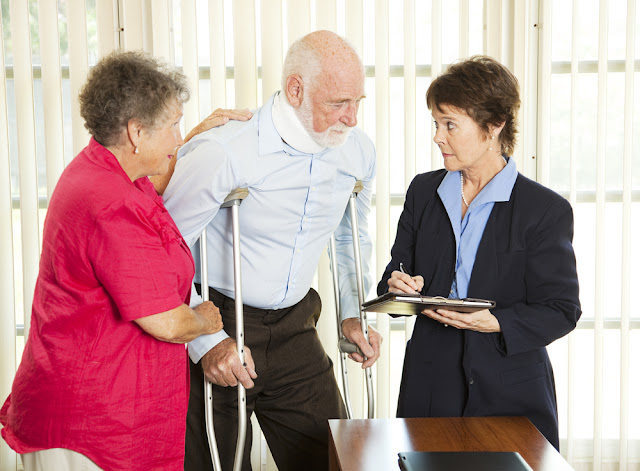Saturday, August 7, 2021
How Personal Injury Lawyers Determine Future Losses after Catastrophic Injury
Tuesday, September 1, 2020
Types of Damages in Personal Injury Cases

When you have been injured or have lost a loved one in an accident, filing a personal injury claim against the at-fault party allows you to recover compensation for your damages. In most personal injury cases, damages are intended to “make the plaintiff whole.” Although no amount of money can change what happened, an attorney can help you understand the types of damages to which you may be entitled if you are hurt, or a family member is killed, due to someone else’s negligence.
Economic Damages
Economic damages are measurable, objectively verifiable financial losses. Common types of economic damages include:
MEDICAL BILLS – Medical expenses such as surgery, hospital stays, physical therapy, rehabilitation, medications, and ongoing treatment can be costly, especially if an injured victim has sustained a catastrophic injury or is permanently disabled. If someone requires lifelong care or adaptive devices like prosthetics, it is important to accurately value future medical costs. Hiring an attorney can help to ensure you receive adequate compensation for both past and future medical expenses.
LOSS OF INCOME – Damages for lost wages include compensation for work that a victim could have earned if they had not suffered an injury. If you are permanently unable to work due to your injury, you may also be entitled to compensation for loss of future earning capacity.
PROPERTY DAMAGE – You may be able to recover compensation for any property damage sustained in an accident that was someone else’s fault. For example, car repair or replacement.
Non-Economic Damages
Also known as general damages, non-economic damages are harder to quantify – they are highly subjective and vary from case to case. It is critical to seek the counsel of a lawyer who knows how to correctly calculate and prove which general damages you may be entitled to recover. Types of non-economic damages include:
EMOTIONAL DISTRESS – People who are severely or permanently injured often suffer from mental anguish, anxiety and stress.
PAIN AND SUFFERING – Those who suffer serious injury may experience chronic physical pain, which can make it impossible to enjoy or even perform everyday activities like taking a walk or playing with their children.
EMBARASSMENT AND HUMILIATION – Reduced ability to function, disfigurement, lack of independence and other conditions can cause injured victims to suffer embarrassment and humiliation.
LOSS OF ENJOYMENT OF LIVE – An injury can deprive you of the pleasure of participating in things you used to enjoy, such as social outings, sports, and hobbies.
LOSS OF COMPAINIONSHIP OR CONSORTIUM – Wrongful death or personal injury can destroy marriages, friendships and other family relationships.
Punitive Damages
Punitive damages may be awarded if an at-fault party’s conduct was particularly outrageous, reckless or malicious. Punitive damages are not designed to compensate the victim – they are intended to punish the wrongdoer and discourage others from committing similar acts. Drunk drivers who cause injury in a car accident often end up being liable for punitive damages in addition to compensatory damages.
How Are Damages Calculated?
Personal injury claims are complex. No two cases are alike, and the amount of damages you may recover depends on the extent of your injuries, how they have impacted your life, and other factors. There is no set way to calculate damages, but insurance companies and attorneys often use the "multiplier method" to determine the total amount of general damages, including pain and suffering.
This means that they take the total dollar amount of economic damages and multiply it by a number that is typically between 1.5 and 5. Your attorney will determine an approximate value of your claim by looking at the evidence surrounding the circumstances and the impact of your injuries. Insurance companies try to undervalue or deny claims any way they can, so it is critical to have a skilled attorney who will fight to help you recover maximum compensation and make things right for you and your family.
If you have been injured or have lost a loved one in an accident, an experienced personal injury lawyer can help you understand your rights and provide legal counsel you can trust.
This blog was originally posted on https://www.pa4law.com/types-of-damages-in-personal-injury-cases/
Tuesday, August 25, 2020
The Importance of Proving Negligence in a Personal Injury Claim

Whether someone is hurt in a car crash or injured in a slip and fall accident, the vast majority of personal injury claims require an injured victim to prove negligence. Learning about the legal concepts of duty of care and negligence can help you understand your rights and why it is important to have a seasoned attorney represent your interests.
What is Negligence?
When someone fails to act with the proper amount of care that a reasonable person would exercise in the same situation, it is considered negligence under the law. Proving negligence goes hand-in-hand with the concept of duty of care, which must also be established in a personal injury claim.
Duty of Care
People have a duty of care to act in a reasonable manner to avoid harming others. For example, when you get behind the wheel of a car you have a legal obligation to follow the rules of the road and drive safely.
Achieving a positive outcome in a personal injury claim usually requires proving these four elements:
The defendant had a legal duty to the plaintiff to use reasonable care. For example, business owners have an obligation to keep their premises safe for all who enter.
The defendant breached that duty by failing to act as a reasonable person should. For instance, a supermarket employee failing to clean-up a spill on the floor in a timely manner would be a breach of duty.
The defendant’s breach of duty caused injury or harm. In the grocery store scenario, a customer slipping and falling on the wet floor would be the “cause” of the injury.
The victim suffered injury or losses that may be compensated by recovering monetary damages. Common types of damages include medical bills, lost wages, emotional distress, and pain and suffering are examples of damages.
Gathering Evidence to Prove Negligence
Each case is unique, with multifaceted aspects that must be proven. Personal injury lawyers understand which types of relevant evidence are required to support the basis of your claim. For example, if you are involved in a car accident, evidence such as photos of the scene, pictures of your injuries, traffic camera footage, police reports, witness statements, and expert testimony from accident reconstructionists can help prove that another party was at fault for the crash and your injuries. When you are injured and trying to heal, collecting vital evidence and building your claim can be stressful and overwhelming. In cases where there is very little evidence, proving negligence can be daunting.
Comparative Negligence in Pennsylvania
In Pennsylvania, the concept of comparative negligence is often applied in personal injury claims. This means that even if you are partially at fault for your injuries, you may seek compensation for damages as long as you were less than 51 percent at fault. It is critical to seek the counsel of an attorney in these types of cases. Insurance companies use all kinds of underhanded tactics to minimize or deny claims. If you are not knowledgeable about how comparative negligence may be applied, you may not recover any compensation for your damages at all.
Personal injury cases are complex. After an accident or injury, it is vital to contact an experienced attorney as soon as you can to ensure your rights are protected. A lawyer can evaluate your case, advise you of your options, and help you move forward if a claim is warranted.
This blog was originally posted on https://www.pa4law.com/the-importance-of-proving-negligence-in-a-personal-injury-claim/
Thursday, October 17, 2019
Personal Injury Lawsuits: 13 Things You Should Know

This blog was originally posted on https://www.pa4law.com/personal-injury-lawsuits-13-things-you-should-know/
Dram Shop Liability in Pennsylvania: When Bars Can Be Held Responsible for DUI Accidents
Every year, thousands of Pennsylvanians are injured or killed in alcohol-related crashes. While drivers who choose to get behind the wheel...

-
If you have suffered an injury due to someone else's negligence, you may be entitled to compensation through a personal injury lawsuit...
-
Your legacy is the thread tha t weaves through generations, manifested not only through memories but also through the impact of your chari...
-
Because of the sheer size of 18-wheelers (as much as 80,0000 lbs.) and other commercial vehicles, accidents involving these vehicles ...



















